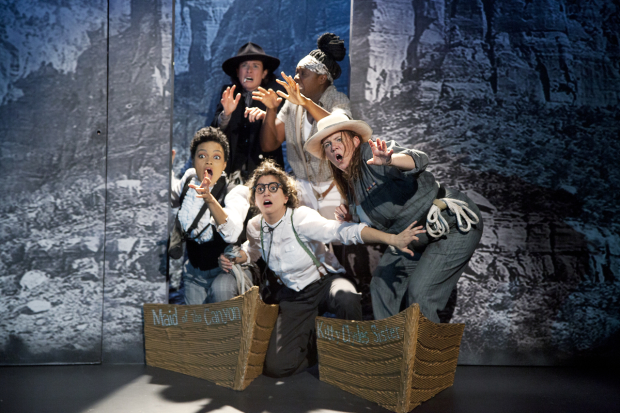Men on Boats

(© Elke Young)
In the summer of 1869, the explorer John Wesley Powell led a band of nine other voyagers on an expedition across the Green and Colorado Rivers. The trip was momentous through its day, a three-month journey through the Wyoming Territory and present-day Utah and Arizona, becoming the first recorded passage of white men through the largely uncharted Grand Canyon.
Over time, the Powell Expedition has faded from memory, becoming a minor cultural footnote about a place that now stands as one of the major tourist attractions in the United States. But it was indeed historic, a fact that dramatist Jaclyn Backhaus explores in her play Men on Boats. The word "men" is a misnomer there; there's not a man onstage in this joint presentation of Playwrights Horizons and Clubbed Thumb. In the eyes of Backhaus, the voyagers are a motley, multicultural assortment of women.
Ten women may be playing 10 men, but Men on Boats isn't a campy parade of drag kings. There's no attention drawn to gender in this boisterous new comedy, imaginatively directed down to the punctuation by Will Davis. As in Lin-Manuel Miranda's juggernaut musical Hamilton, which features predominantly black and Latino actors portraying the Founding Fathers, Men on Boats uses the lens of the present to explore a story from our shared cultural past. The result, like Hamilton, is kind of ingenious.
Men on Boats uses an episodic structure to explore the journey of the one-armed Powell (Kelly McAndrew) and his men, five of whom were Civil War veterans, the rest either hunters or explorers. On their four wooden boats, they endure choppy whitewater, losses of rations and oars, and the overwhelming fear that imminent death in the hands of the rapids through which they're sailing.
While there is primary source material that inspired Men on Boats (namely Wesley's published diary The Exploration of the Colorado River and Its Rapids), Backhaus doesn't attempt to re-create the antiquated speech patterns or movement of the late 1800s. The characters here talk in a distinctly contemporary vernacular. Backhaus is illuminating an otherwise dusty piece of history, not only making it consumable for contemporary audiences, but lively as well.
Conversely, Davis' creative team, in fact, does try to capture the milieu of the time period. Arnulfo Maldonado's wide-open set is most notable for its backdrop, a black-and-white photo of vast canyons that, when lit by Solomon Weisbard, takes on a personality of its own. Ásta Bennie Hostetter's costumes look exactly as we would imagine for that period. Jane Shaw contributes an epic, soaring soundscape that feels like it's been pulled from an old Western.
In terms of staging, Davis knows exactly when to turn the level of frenzy up to 11, and when to modulate it down to a more human sphere. It's hard to single out any cast member as being better than another; in Davis' hands, this perfect 10-member ensemble perform their roles with laserlike precision. It's their skill, and the tug-of-war between the old and the new, that makes Men on Boats such refreshing, enjoyable theater.











